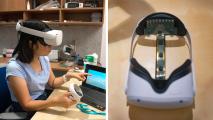
Biotech
Human history has been all but defined by death and disease, plague and pandemic. Advancements in 20th century medicine changed all of that. Now advancements in 21st century medicine promise to go even further. Could we bring about an end to disease? Reverse aging? Give hearing to the deaf and sight to the blind? The answer may be yes. And soon.
More
Extreme treatment for alcoholism slashes drinking by 90% in monkeys
An in-development treatment for alcoholism dramatically reduced consumption in monkeys that previously drank heavily.
Mental illnesses affect brain structure, but in surprisingly different ways
A new brain mapping study identified commonalities in the brains of people with mental illnesses, and it could lead to better treatments.
“I’ve been here before”: DMT study explores a strange memory phenomenon
DMT can induce a sense of profound familiarity, making users feel as if they have entered an alternate reality they have visited before.
Brain stimulation helps people with Parkinson’s walk
A noninvasive form of brain stimulation developed by Japanese researchers improved the symptoms of Parkinsonian gait in a small trial.
Too much body fat isn’t the problem — malfunctioning body fat is
When fat cells are overloaded with excess nutrients, they become too big and don’t receive enough oxygen, causing them to die.
With “thanabots,” ChatGPT is making it possible to talk to the dead
ChatGPT is making it possible to digitally resurrect the dead in the form of thanabots: chatbots trained on data of the deceased.
Vaccine for common virus could prevent MS
An experimental vaccine designed to prevent an EBV infection might also prevent cancer and multiple sclerosis.
This unique human brain structure may have given us speech
Speech is unique to humans, yet most brain structures involved in speech are also present in Old World monkeys and other primates — except this one.
Existing heart drug may boost treatment for skin cancer
The FDA-approved heart medication ranolazine boosted the efficacy of a BRAF inhibitor in mouse models of melanoma, the deadliest skin cancer.
Scientists make pain relievers like Tylenol from pine trees rather than fossil fuels
Chemists have shown how to manufacture ibuprofen and acetaminophen using a waste product from the forestry and paper industries.
Scientists tweak Meta VR headset to measure brain activity
A modified VR headset that records brain activity reveals how being immersed in VR impacts people on a neurological level.
Weight-loss drug cut the risk of heart attack and stroke by 20% in large trial
The weight-loss drug semaglutide reduced patients’ risk of heart attacks, strokes, or death from heart disease by 20% in a large trial.
Nematodes survive 46,000 years on ice
A pair of nematodes from the Pleistocene survived in the Siberian permafrost by entering a survival state known as cryptobiosis.
Fragile X syndrome often results from improperly processed genetic material
Researchers discovered that the mutated gene responsible for fragile X syndrome is active in most people with the disorder, not silenced.
Study finds tracking brain waves could reduce post-op complications
Researchers found brain wave signatures that could help determine when patients are transitioning into a deep state of unconsciousness.
AI-powered brain implant restores feeling, movement in man with paralysis
A first-of-its-kind AI-powered brain implant has restored movement and feeling in a New York man with quadriplegia since 2020.
Targeted therapy kills every type of cancer in the lab
City of Hope researchers are trialing a targeted therapy shown to kill more than 70 types of cancer in preclinical tests.
Want to lose weight? Try eating like a pig
From pig studies, we’ve learned that calorie counting matters, and eating many smaller meals is preferable to a few larger ones.
Northern white rhinos are set for extinction. Only a technological moonshot can save them.
Project BioRescue aims to create the reproductive technology necessary to resurrect the northern white rhino. But time is running out.
Australian military is funding a computer chip merged with human brain cells
The Australian military is funding research into “organoid intelligence” that involves stimulating lab-grown mini-brains with electrodes.
Subscribe to the newsletter































